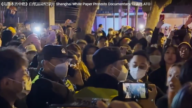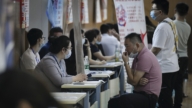【新唐人2013年12月09日訊】中共官方消息,截至11月份,大陸的「微博」賬戶已經突破了13億。中共官媒對此專門舉行會議,探討如何利用「微博」加強和傳遞官方聲音。評論認為,不管官媒採取甚麼做法,只要不能真正的做到新聞自由,無論建立多少「微博」賬號,占有多大輿論陣地,都不會獲得民眾的認可。
據中共喉舌《人民日報》報導,由中共的「網際網路信息辦公室」和《人民日報社》聯合舉辦的會議上,「國信辦」官員公布,截至11月底,全中國的「微博」賬戶已經突破13億,成為網上信息傳播的主要途徑之一。對此,來自27家媒體的61位媒體法人「微博代表」,就如何加強所謂「官方媒體的微博影響力」進行了討論。
而觀察人士認為,「微博」和「微信」等媒體發展迅速,深入人心,已經令中共官媒感到了致命威脅。
中國網路自由觀察人士 野渡:「微博和微信現在對官方媒體產生的衝擊力是有目共睹的,因為一直以來媒體資源都是被政府所擁有,民間發不出聲音。事實上微博形成了一個自媒體效應,每個人通過微博發出聲音,這樣的話就吸引了網民的注意力。」
儘管中共網路管控極為嚴厲,但「微博」這塊相對自由的平臺,仍然吸引了越來越多的中國網民。 甚至有很多人一次次的被封號,又一次次的堅持「復活」。
大陸網友秀才江湖:「我們中國的微博,說實話,是朝不保夕的,隨時會封號的。我一個人就註冊了幾十個微博,因為前面的微博都封號了,只能重新申請微博。死掉的微博比活的微博還多,你批評政府嚴厲了,它就把你給取消了、封號了。有些人封了幾百次都有,我們在微博上稱為『轉世黨』。」
「微博」在民眾中造成的巨大影響力,使得越來越多的官媒和政府機構,爭相在網路上設立「官方微博」,試圖佔領更多的「輿論陣地」。但網路觀察人士野渡認為,中共當局過於高估了官媒的地位。
野渡:「很難做到,因為現在普遍來說,官方的聲音是很難再讓民眾相信,在目前官民矛盾激烈衝突的情況下,在官方已經失去公信力的情況下,它是不可能再做到這一點的。民眾情願相信在微博上面已經普遍有了公信力的那個用戶,像大V啊、公知啊、還有民間草根啊等等這些人。」
網民們坦言,官媒和《央視》多年來只做所謂「正面」報導,「只會歌功頌德,不見民間疾苦」,甚至「喪事當作喜事報」,早已喪失了民心。
秀才江湖:「現在不是以前那種《新聞聯播》主宰天下的時候,以前那個年代只有官方的聲音,沒有民間的聲音。他只能聽到一面之詞,所以他相信這一面之詞,現在有了微博,官方媒體的謊言就一目瞭然顯現出來。官方撒謊不容易了,民眾不容易受欺騙了。」
中國網路自由觀察人士野渡表示,自從有了「微博」以後,官方一直沒有停止對「微博」的打擊或者操控。但是這麼多年過去了,「微博」卻越發壯大。因為網際網路媒體特點,中共當局如果想在這麼大的平臺進行操控,需要付出的資源相當驚人,因此當局只能打壓一些「重點」。
野渡認為,在目前的社會心理狀況下,無論是打壓或者是恐嚇、威脅等,都很難在民眾中產生示範效應,中共當局試圖阻擋天下大勢,絕對是螳臂當車。
採訪/易如 編輯/張天宇 後製/李智遠
Party Mouthpieces See Weibo 1.3 Billion Users as a Threat
The Chinese Communist Party (CCP) officially announced
that by November, the number of China’s Weibo accounts
had exceeded 1.3 billion.
In response, the Party’s mouthpiece media held a thematic
meeting discussing how to strengthen the delivery of
“Party voices” via Weibo.
Commentators say as long as freedom of the press is not
realized, party media will never be recognized by the public,
No matter what they do, how many Weibo accounts they
create and how hard they struggle to affect public opinions.
CCP mouthpiece People’s Daily reports that they’ve
cooperated with the State Internet Information Office (SIIO)
to hold a thematic meeting.
In the meeting, the SIIO announced that China’s Weibo
accounts had surpassed 1.3 billion by the end of November,
making Weibo a major online channel for information.
61 “Weibo representatives” from 27 state-media entities
then discussed about how to “improve impact of
official media on Weibo”.
China affairs observers say social networks such as Weibo
and WeChat have been developing rapidly
and broadly in China, a fact which those party mouthpieces
see as life-threatening.
Yedu, observer of China’s Internet freedom: “Everyone now
sees the great impact of Weibo and WeChat on Party media.
As China’s media resources have always been occupied by
the CCP government, Chinese people used to have no voice.
In fact, Weibo has the effect of letting people be the media.
Everyone voices himself on Weibo, which is
what gradually attracts most netizens into the platform.”
Although the CCP holds extremely tight Internet control,
as a relatively freer platform Weibo still draws
more and more netizens into using it.
Many users even seem to “resurrect” again and again,
no matter how many times their accounts are blocked.
Xiucai Jianghu, Chinese netizen: “Honestly, China’s Weibo
account can be blocked at any time.
I registered dozens of accounts for myself,
since all my previous ones had been blocked.
I’ve had to register again and again, and Weibo has
more dead accounts than active ones.
If you make a harsh criticism against the government,
it will block or delete your account.
Some users have been blocked hundreds of times;
so on Weibo we call them the ‘Reincarnated Party’.”
The great impact of Weibo among Chinese people has also
driven more party media and governmental agencies
to set up their “official Weibo” accounts.
By doing this, they attempt to occupy more
“battlefields for propaganda”.
However, Internet observer Yedu says the CCP has
overestimated its media’s influence.
Yedu: “It is hard for them to do that, because now the CCP’s
official voice are not trusted by the people in general.
Especially as conflicts between government and people
become more serious,
and the CCP authority has lost its credibility,
it is impossible to control public opinions on Weibo.
The public prefer to trust more on credible users such as
『Big Vs’ (high profile, verified users), public intellectuals and
grass-roots, etc.”
Netizens say CCTV and other mouthpieces have only done
so-called “positive” reports all these years, and
“only glorify the party” but never “care about the people’s
pains”, and they even “report disaster as delight”;
they had lost their credibility a long time ago.
Xiucai Jianghu: ”The times when everyone watches CCTV
news has passed.
At that time there were voices only from the party
and nothing from the people.
All they could hear were the party’s one-sided words
and they so trusted them.
Now we have Weibo. This makes it very easy to recognize
the false reports from official media.
So it becomes harder for the party to fabricate news
and deceive the public.”
Yedu says that since Weibo was created, the CCP has never
stopped suppressing or attempting to control it;
however, this has only resulted in the rapid growth of Weibo
over these years.
One reason is due to the characteristics of social media.
To control such a huge platform, the CCP has to spend
enormous resources.
In reality all it can do is to focus on
some “important objectives”.
Yedu says that under the current social psychological
condition in China, suppression and intimidation
can hardly silence chinese people anymore.
The CCP is simply making useless efforts to stop
the general trend of the world.































